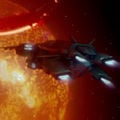D81-LRT Condor: Difference between revisions
From Halopedia, the Halo wiki
NightHammer (talk | contribs) No edit summary |
NightHammer (talk | contribs) m (Read that wrong) |
||
| Line 28: | Line 28: | ||
===Armaments=== | ===Armaments=== | ||
Most Condors are unarmed, | Most Condors are unarmed, with a multi-sensor package often replacing a Pelican's armaments. Though in some variants, the D79-TC Pelican's dual [[GAU/53 70mm MBHRC autocannon]]s are retained. Six [[hardpoint]]s are retained on the Condor's wings to allow colonial operators to create custom fire control systems to tie these into the civilian controls.<ref name="Waypoint"/> | ||
==Variants== | ==Variants== | ||
Revision as of 20:53, April 3, 2015
The D81-LRT Condor, formally designated the D81-Long Range Transport and colloquially referred to as a Fat Pelican or a SuperPelican by its users, is a medium-sized, long-range aerospace transport craft manufactured by Misriah Armory that is built from the airframe of a Pelican dropship.[1][2]
Specifications
Design details
The D81-LRT Condor is built using an elongated Pelican dropship fuselage; the current Condor model uses a D79-TC Pelican frame. Approximately ninety-five percent of the Condor's parts originate from the Pelican that it was built upon. The Pelican's original flight systems, engines, and structural spars are borrowed to in the creation of the Condor. However, the original tail thrusters are removed and replaced with the "Mission Package", which consists of four engine pods and a slipspace drive[2][3] capable of short to mid-range slipstream space travel. The Condor features two cockpits, with the upper cockpit housing the dropship's weapons or sensor operator.[2]
Apart from being substantially longer the Condor has additional thrust nozzles and what appears to be a second deployment bay on the tail boom; this bay likely houses the slipspace drive. The Condor's compact and occasionally temperamental slipspace drive led to the dropship being very expensive, especially on the civilian market. However, advances following the Human-Covenant War have severely decreased commercially available unit costs. Maintenance has remained a problem for the Condor. The dropship's slipspace drive is rated for only five trips before it requires a comprehensive retuning, and eight trips before the Condor's drive has to be fully rebuilt.[2]
Armaments
Most Condors are unarmed, with a multi-sensor package often replacing a Pelican's armaments. Though in some variants, the D79-TC Pelican's dual GAU/53 70mm MBHRC autocannons are retained. Six hardpoints are retained on the Condor's wings to allow colonial operators to create custom fire control systems to tie these into the civilian controls.[2]
Variants
Several variants of the D81-LRT Condor exist:
- D80: Original Condor: A variant that is built from a D77-TC Pelican. With limited slipspace travel capabilities, its travel time is double that of its larger, more efficient successors.[2]
- D81: Post-War Condor: Equipped with a more efficient slipspace drive and built from excess D79-TC Pelican frames, the post-war variant has the upper cockpit either stripped out or converted into VIP seating.[2]
- D81WP: The WP (Weapons Package) variant retains the D79 Pelican's autocannon and is sold to the UNSC, paramilitary units, and planetary security forces by Misriah Armory.[2]
- U81: The U81 is an unofficial designation for refit Condors used by the Office of Naval Intelligence during reconnaissance and surveillance missions. This variant is outwardly indistinguishable from civilian starships, but the U81 incorporates an advanced electronic warfare suite, an extensive passive sensor array, and a military-grade slipspace drive. This variant is sometimes classed as a "subprowler" due to its covert mission profile, although it lacks passive cloaking or sensor baffling coatings.[2]
Development and operational history
Formerly a dropship in service with the United Nations Space Command, the Condor was virtually unparalleled in its role of heavy materiel and equipment deployment. However, due to the D96-TCE Albatross and D82-EST Darter's lower development and operational costs along with overlapping functionality the Condor ultimately faded from service in the UNSC. The Condor sees continued use by the Sedran Colonial Guard as it is able to work without the need for a larger vessel to deploy from. It is also ideal for low-volume freighting between the Outer Colonies that wish to become autonomous from the Unified Earth Government. The Condor allows colonists to cross long distances, scout possible trade routes, and establish diplomatic relationships without interference of the UNSC or its control on interstellar commerce.[2]
The Sedran Colonial Guard used one Condor during the mission to Alpha Shard, alongside several Office of Naval Intelligence operatives.[4] After traveling to the shard, Thanolekgolo that dwelled on the ring located the dropship and attacked it. The Condor's pilot was killed and the worms caused the dropship to spin out of control and crash.[5] The now-barely functioning Condor was later used by Jameson Locke and Talitha Macer to travel to a Bactrian-class freighter. Crash-landing the Condor nearby, the two managed to board the freighter and escape the Halo fragment.[6]
Trivia
- A condor is a kind of vulture, in keeping with the UNSC's tradition of naming aerospace craft after birds.
- The Condor was known as the Super Pelican during the early stages of production on Halo: Nightfall.[1]
Gallery
A Sedran Condor approaching Installation 04
List of appearances
- Halo: Nightfall (First appearance)
Sources
- ^ a b GameSpot: Comic-Con 2014: Halo Nightfall Directly Leads Into Halo 5 Guardians
- ^ a b c d e f g h i j Cite error: Invalid
<ref>tag; no text was provided for refs namedWaypoint - ^ YouTube: Halo: Nightfall Panel - SDCC 2014
- ^ Halo: Nightfall, Episode 1
- ^ Halo: Nightfall, Episode 2
- ^ Halo: Nightfall, Episode 5
